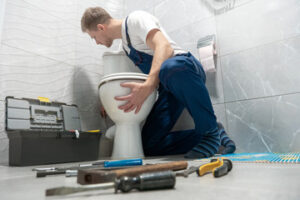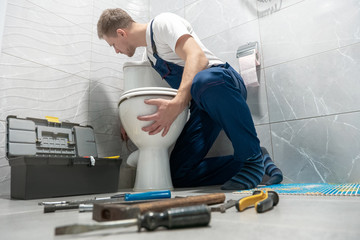The Neighborhood Plumber is responsible for installing, repairing and maintaining plumbing systems. These include piping systems that distribute water and sewage, as well as heating and cooling systems. They work in both residential and commercial settings.
They are often called upon to fix burst pipes and clogged drains, but they also play an important role in new construction and maintenance. They must have excellent customer service skills and be physically fit.
When many people think of plumbers, they picture clogged toilets and leaky pipes. However, the job of a plumber encompasses much more than unblocking drains and fixing water heaters. Plumbers are responsible for the plumbing and sewage infrastructure that keeps our society functioning, and they play an important role in protecting us from disease and keeping our environment clean. They also design, build, and repair these vital systems. In addition, they work in a variety of settings and often have to deal with challenging situations. This makes it a versatile and interesting career choice.
There are many different types of plumbers, each with a unique set of responsibilities and skills. Some plumbers specialize in residential or commercial work, while others focus on installation and service. In general, a plumber’s job description includes installing and repairing piping, fixtures, appliances, and other related equipment. They may also install and repair fire sprinkler systems and waste disposal systems. Additionally, they may be called on to perform emergency services, such as responding to a flooded basement or leaking roof.
Plumbing jobs are considered recession-proof, as they are necessary for every home and business. As a result, they are in high demand and offer good job stability. Moreover, skilled plumbers can find employment opportunities anywhere in the country, as many new buildings and homes require plumbing systems to be installed as they are being built.
Plumbers working on residential projects typically focus on the plumbing systems of single-family dwellings, including apartment complexes and private homes. They are usually involved in the installation and maintenance of a variety of plumbing fixtures, including sinks, bathtubs, toilets, showers, and water heaters. They may also be required to install and repair septic systems, garbage disposals, and heating and cooling units.
In contrast, industrial plumbers focus on large-scale plumbing systems that are found in commercial and industrial buildings. They may work on plumbing systems for offices, hospitals, restaurants, factories, and power plants. Industrial plumbers also work with specialized equipment, such as water treatment plants and process piping.
Finally, service and repair plumbers are the “troubleshooters” of the plumbing world. They are the ones who respond to callouts from residential, commercial, and industrial clients to address problems such as faulty toilets, clogged drains, and broken water heaters. In this role, plumbers must be personable and capable of addressing a variety of issues quickly and effectively.
Education and training requirements
As plumbing is a highly technical skill, education and training are essential. Plumbers must pass a state exam, complete an apprenticeship program, and have experience in the field before becoming licensed. In addition, they must continue their education by attending workshops and seminars to learn new skills. They may also pursue advanced certifications to improve their job prospects and expand their knowledge base.
Plumbers install, repair, and maintain the pipes that carry water or gases into and out of buildings. They can work in residential, commercial, or industrial settings. They are required to work in tight spaces with a variety of tools, and they often work outdoors. Plumbing can be a physically demanding job, and plumbers are often exposed to hazardous materials like natural gas or human waste.
Those interested in pursuing a career as a plumber can attend a vocational school or complete an online course. Choosing an accredited program will help ensure that you receive a high-quality education and that the training you receive is transferable to the workplace. In addition, look for programs that offer a combination of classroom learning and hands-on practice. Online resources such as instructional videos and virtual simulations can help supplement your coursework and reinforce key concepts.
Many students begin their careers as apprentices, completing a four to five-year program that combines on-the-job training and classroom instruction. Apprentices learn to troubleshoot complex plumbing issues and design systems under the mentorship of seasoned professionals. They also have the opportunity to learn to read and interpret technical diagrams and blueprints. In some states, completion of an apprenticeship can lead to journeyman status and eventually to licensure as a master plumber.
Those who have already completed an apprenticeship can take the state’s licensing exam, which requires at least two to five years of experience and successful completion of a written test. Those who want to become master plumbers can take an even more challenging examination, which covers everything from advanced plumbing practices to business management. Continuing education is also an important part of the job, and it is essential for plumbers to stay updated on industry standards.
Work environment
Plumbing is an exciting career option that offers variety, stability, and earning potential. It is also a highly respected and skilled trade that contributes to the safety, health, and comfort of people in homes and businesses. Plumbers take pride in their work and understand that every meticulously installed pipe or impeccably repaired fixture serves a deeper purpose—enhancing the safety, health, and well-being of the communities they serve.
Plumbers work in a wide range of environments, including residential homes, commercial buildings, and industrial settings. They may specialize in specific areas such as installation, maintenance, or gas equipment. Some plumbers choose to focus on residential plumbing, while others prefer the more challenging tasks involved in commercial or industrial projects.
Most plumbers start their careers by completing an apprenticeship program, which includes classroom instruction and paid on-the-job training. Apprenticeship programs typically last four to five years and cover 2,000 hours of hands-on work experience. After completing an apprenticeship, plumbers must pass a state exam to become licensed. The licensing process can be difficult, but it is vital for the success of plumbers.
In addition to technical skills, plumbers must have strong customer service skills. They must be able to explain problems clearly, propose solutions, and provide estimates. They also need to stay up-to-date on new plumbing technologies and techniques.
Another important aspect of the job is physical strength and stamina. Plumbers frequently work in tight spaces and on ladders and scaffolding, and they must be able to lift heavy equipment. They also need to be comfortable working in dirty or unpleasant environments, such as sewage systems or drains.
Another part of the job involves interacting with customers and maintaining records. Plumbers must be able to communicate orally and follow written directions. They also need to be able to solve complex problems and make decisions under pressure. A plumber’s ability to assess situations and determine the best course of action can save time and money for their clients. In addition, plumbers must comply with legal regulations and follow safety procedures. This can be a challenge, especially for those who are unfamiliar with local laws.
Salary
As with any career, plumbers’ salaries can vary based on their level of experience, specialization, and certifications. However, they are generally well-paid professionals who enjoy good job stability and opportunities for professional growth. Many also choose to start their own plumbing businesses, which can offer even more financial rewards. This is a great option for those who want to stay actively engaged in their work and avoid the dreaded office desk job.
In addition to salary, benefits and perks of being a plumber include flexible working hours and the opportunity to move into different specialty areas. For example, some plumbers focus on gas line installation, while others specialize in water systems and sewage. Some may also opt to become green plumbers, who focus on sustainable plumbing solutions. Some plumbers may also earn extra income by selling industry tools and promoting home service software.
Plumbers’ work can be very challenging, but it is rewarding as well. They often work in tight and confined spaces, and they must be strong and intelligent. They must also have the ability to read blueprints and understand building codes. Additionally, they must be able to make quick decisions in emergency situations. As a result, plumbers’ salaries can be quite competitive, especially when they are in high demand.
Another benefit of this type of work is that it is fairly recession-proof. While other jobs see a drop in demand during economic downturns, plumbers are always in need because of the necessity of clean water and sewage systems. Additionally, a plumber’s work directly impacts people’s lives, so they can feel a sense of satisfaction when they fix problems like leaky pipes or broken toilets.
Plumbers need a variety of skills to perform their duties, including the ability to read and interpret blueprints, install fixtures and appliances, and repair plumbing problems. They must also have the ability to work in a variety of settings, including residential and commercial buildings. In some cases, plumbers need to work on large-scale plumbing projects such as installing water systems and sewage systems in hospitals, schools, and office buildings.

